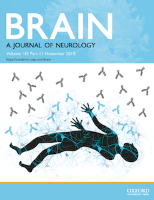
BRAIN
Scope & Guideline
Leading the Charge in Clinical Neurology Advancements
Introduction
Aims and Scopes
- Neurodegeneration and Cognitive Decline:
Research focusing on the mechanisms of neurodegenerative diseases such as Alzheimer's and their impact on cognitive functions in aging populations. - Brain Aging Mechanisms:
Investigations into biological and physiological changes associated with aging in the brain, including structural and functional alterations. - Neuroimaging and Biomarkers:
Utilization of advanced neuroimaging techniques and biomarker analysis to study brain health and disease progression in aging individuals. - Interventions and Therapeutics:
Studies exploring therapeutic interventions, lifestyle modifications, and rehabilitation strategies aimed at mitigating cognitive decline and enhancing brain health. - Psychosocial Factors and Brain Health:
Examination of how psychological, social, and environmental factors influence brain aging, cognitive resilience, and overall mental health.
Trending and Emerging
- Precision Medicine Approaches:
An emerging focus on personalized medicine strategies, particularly in the context of dementia and Alzheimer's, emphasizing tailored interventions based on individual biological profiles. - Interdisciplinary Research on Aging:
Increased collaboration across disciplines, incorporating insights from psychology, neuroscience, and social sciences to address complex aspects of aging and brain health. - Technological Innovations in Neuroimaging:
A trend towards utilizing advanced neuroimaging technologies to better understand brain structure and function in aging populations, enhancing diagnostic capabilities. - Role of Physical and Mental Interventions:
Growing interest in exploring how physical activity, cognitive training, and lifestyle modifications can positively impact cognitive resilience and brain function in older adults. - Impact of Sleep on Cognitive Function:
Emerging research focusing on the relationship between sleep quality and cognitive performance, highlighting its significance in aging and neurodegenerative conditions.
Declining or Waning
- Focus on Non-Aging Related Neurological Disorders:
Research topics primarily addressing neurological disorders unrelated to aging, such as acute brain injuries or pediatric neurological conditions, have become less frequent. - Historical Perspectives on Dementia:
There has been a waning interest in purely historical analyses of dementia that do not contribute to current understanding or treatment strategies. - Generalized Studies on Cognitive Aging:
Broad studies on cognitive aging without specific focus on underlying mechanisms, interventions, or targeted populations are appearing less frequently. - Single-Factor Studies:
Research focusing on isolated factors affecting brain health, without consideration of complex interactions among biological, psychological, and social determinants, is declining. - Basic Science without Clinical Relevance:
There seems to be a reduction in basic science studies that lack direct implications for clinical practice or therapeutic development.
Similar Journals
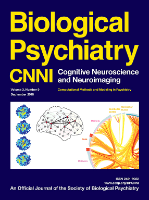
Biological Psychiatry-Cognitive Neuroscience and Neuroimaging
Illuminating the Pathways of Cognitive NeuroscienceBiological Psychiatry-Cognitive Neuroscience and Neuroimaging is a leading interdisciplinary journal published by Elsevier, focusing on the convergence of biological psychiatry, cognitive neuroscience, and advanced neuroimaging techniques. With its prestigious Q1 rankings across essential categories such as Biological Psychiatry, Cognitive Neuroscience, and Neurology (clinical), this journal is at the forefront of research that examines the complexities of mental health through innovative methodologies. Covering a broad spectrum of topics from neurobiological mechanisms to clinical applications, it aims to provide a platform for scholars and practitioners to exchange insights on mental disorders and their neurobiological underpinnings. The impact factor and Scopus rankings further underscore its importance, with rankings highlighting its position in the top percentiles of related disciplines. By fostering an open exchange of ideas and promoting cutting-edge research, this journal is an essential resource for researchers, professionals, and students dedicated to advancements in the understanding and treatment of psychiatric and neurological conditions.

BRAIN TOPOGRAPHY
Charting New Territories in Cerebral ImagingBRAIN TOPOGRAPHY is an esteemed academic journal dedicated to the exploration of topographical mapping of brain activities, cementing its reputation as a cornerstone in the fields of anatomy, neurology, and radiology. Published by SPRINGER, this journal has been a vital resource since its inception in 1988, with a steadily increasing impact reflected in its 2023 rankings, including Q1 categories in Anatomy and Radiology. With its significant contributions to understanding cerebral structure and function through advanced imaging technology, BRAIN TOPOGRAPHY is essential for researchers, professionals, and students seeking to stay at the forefront of neuroscientific advancements. The journal benefits from its strong academic stature, positioned within the 60th to 71st percentiles across several Scopus ranks, further enhancing its visibility in an evolving research landscape. Although not an open-access journal, its rigorous peer-review process ensures the dissemination of high-quality research that significantly contributes to the scientific community. Set against the backdrop of a global landscape, this journal continues to shape discussions on cerebral topography, offering a platform for innovative studies and critical insights.
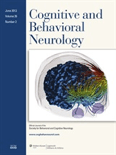
Cognitive and Behavioral Neurology
Elevating Knowledge in Cognitive and Behavioral NeurologyCognitive and Behavioral Neurology is a prominent peer-reviewed journal dedicated to advancing the understanding of cognitive and behavioral aspects of neurological disorders. Published by Lippincott Williams & Wilkins, this journal has established itself as a vital resource for researchers, clinicians, and students in the fields of cognitive neuroscience, neuropsychology, and psychiatry. With an ISSN of 1543-3633 and an E-ISSN of 1543-3641, it offers a robust platform for the dissemination of high-quality research, as evidenced by its positioning in the Q3 quartiles across various categories, including Cognitive Neuroscience and Psychiatry. The journal, which has been actively publishing since 2003, encourages innovative studies that explore the intersection of cognition and behavior in neurological contexts. As a vital contributor to the academic dialogue on these topics, it provides an essential archive of findings and discussions that inform clinical practice and educational approaches, reflecting its commitment to improving patient outcomes and enhancing neurological science.

Frontiers in Aging Neuroscience
Unlocking Insights into Cognitive Aging.Frontiers in Aging Neuroscience, published by FRONTIERS MEDIA SA, is a leading open-access journal dedicated to the field of aging neuroscience, with its ISSN being 1663-4365. Since its inception in 2009, this journal has provided a platform for researchers to disseminate their findings on the neurological aspects of aging, addressing critical issues that impact cognition and overall brain health in the elderly population. With a commendable 2023 impact factor, the journal ranks in the Q2 category in both Aging and Cognitive Neuroscience, positioning it among the top-tier publications in these fields. Notably, it is recognized within Scopus, ranking #32 out of 115 in Neuroscience (Cognitive Neuroscience) and #20 out of 38 in the Aging sector, with corresponding percentiles of 72nd and 48th, respectively. As an open-access journal, it promotes unrestricted access to research findings, fostering collaboration and innovation among the academic community. Researchers, professionals, and students alike can explore cutting-edge studies that contribute to understanding the complexities of neurological aging and work towards improving cognitive health in an aging society.

Aging Brain
Advancing Knowledge on Aging and CognitionAging Brain is a premier Open Access journal published by Elsevier, dedicated to advancing the understanding of the neurobiological changes associated with aging. Since its commencement in 2021, this journal has been pivotal in disseminating high-quality research that explores the intricate relationships between aging and cognitive functions, neurological disorders, and overall brain health. With a notable commitment to open accessibility, Aging Brain ensures that vital findings are available to a global audience, fostering collaboration and innovation in the field. Researchers, healthcare professionals, and students alike will find a rich repository of cutting-edge studies, reviews, and insights aimed at addressing the complexities of the aging brain. The journal stands as an influential platform for those passionate about enhancing the quality of life for the aging population, making it a valuable resource in gerontology and neuroscience.

Behavioral and Brain Functions
Bridging Gaps in Behavioral and Biological PsychiatryBehavioral and Brain Functions is a leading Open Access journal published by BMC, dedicated to advancing the field of behavioral neuroscience, cognitive neuroscience, and biological psychiatry since its inception in 2005. This esteemed journal, based in the United Kingdom, has established itself as a vital resource for researchers and professionals, boasting a remarkable influence demonstrated by its Q1 and Q2 rankings across multiple relevant categories. With its commitment to providing unrestricted access to high-quality research, the journal facilitates the dissemination of significant findings in understanding the complex interactions between behavior and brain function. The journal ranks impressively within the Scopus database, positioning itself among the top-tier publications in its categories, making it an essential platform for academic discourse and innovation. As it converges through 2024, Behavioral and Brain Functions continues to play a crucial role in shaping the forefront of neuroscientific inquiry, inviting contributions that challenge our understanding and promote further exploration in these dynamic fields.
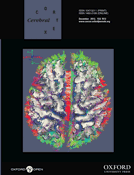
CEREBRAL CORTEX
Shaping the future of neuroscience discovery.CEREBRAL CORTEX, published by Oxford University Press Inc, is a premier journal dedicated to advancing the field of neuroscience, specifically focusing on the cellular, molecular, and cognitive aspects of cortical structure and function. With an impressive impact factor that situates it in the top quartile (Q1) of its categories for 2023, this journal holds significant relevance for researchers and professionals interested in the latest discoveries and methodologies in both Cognitive Neuroscience (ranked #31 out of 115) and Cellular and Molecular Neuroscience (ranked #48 out of 97). Operating without an open access model, it ensures rigorous peer review and dissemination of high-quality research from across the globe. Since its inception in 1991, CEREBRAL CORTEX has established itself as a critical platform for educators and inventors, pushing the boundaries of knowledge in understanding brain function and its implications for behavior. Researchers and students alike will find this journal an invaluable resource for both foundational and cutting-edge studies in neuroscience.

RESTORATIVE NEUROLOGY AND NEUROSCIENCE
Innovative Insights: Shaping the Future of Neurological RecoveryRESTORATIVE NEUROLOGY AND NEUROSCIENCE, published by IOS PRESS, is a premier journal dedicated to advancing the fields of neurology and neuroscience. Since its inception in 1989, this journal has played a crucial role in disseminating cutting-edge research findings and innovative therapeutic approaches that aim to restore neurological function and improve patient outcomes. With a focus on developmental neuroscience and clinical neurology, the journal holds a 2023 Scopus ranking of #129 out of 400 in clinical neurology, and #15 out of 37 in developmental neuroscience, reflecting its significant influence in these domains. Although it operates on a non-open access model, RESTORATIVE NEUROLOGY AND NEUROSCIENCE offers valuable insights for researchers, healthcare professionals, and students seeking to deepen their understanding of neural restoration mechanisms and therapeutic strategies. Located in Amsterdam, Netherlands, the journal continues to foster scholarly dialogue and innovation, contributing to the global advancement of neuroscience and neurology.

EXPERIMENTAL AGING RESEARCH
Innovating Knowledge for a Longer LifeEXPERIMENTAL AGING RESEARCH, published by Taylor & Francis Inc., is a leading journal that has been at the forefront of aging research since its inception in 1975. With an ISSN of 0361-073X and an E-ISSN of 1096-4657, this journal has earned a notable reputation, including a Q3 ranking in the field of Aging and impressive Q1 and Q2 rankings in Arts and Humanities and Geriatrics and Gerontology respectively. This positions the journal within the top percentile of its category, highlighting its significant impact and contribution to the scientific community. Covering a broad scope that intersects various disciplines, EXPERIMENTAL AGING RESEARCH aims to disseminate pioneering research, foster interdisciplinary collaboration, and provide a platform for innovative studies that enhance understanding of the aging process. While it currently does not offer Open Access, researchers and academics can access its rich repository of knowledge that spans multiple facets of aging, from physiological changes to psychological impacts. As the field of aging continues to evolve, this journal remains an essential resource for researchers, professionals, and students dedicated to advancing knowledge and practices concerning aging and longevity.
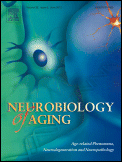
NEUROBIOLOGY OF AGING
Bridging Research and Innovation in Aging NeuroscienceNEUROBIOLOGY OF AGING, published by Elsevier Science Inc, is a premier journal dedicated to advancing our understanding of the complex interactions between the aging process and neurobiological mechanisms. With an ISSN of 0197-4580 and E-ISSN 1558-1497, the journal has established itself as a critical resource in the fields of Aging, Developmental Biology, Geriatrics and Gerontology, Clinical Neurology, and Neuroscience. Boasting a Q1 ranking in multiple categories, the journal is positioned within the top echelons of scholarly publication, underscoring its significant impact with an impressive Scopus ranking in various subfields. Committed to disseminating high-quality, peer-reviewed research, NEUROBIOLOGY OF AGING welcomes original articles, reviews, and research notes aiming to uncover the underlying processes of aging on the nervous system, fostering collaboration among researchers, professionals, and students alike. Although primarily subscription-based, the journal continues to play a vital role in shaping the discourse on aging and neurobiology, making it an essential publication for those engaged in this dynamic field.